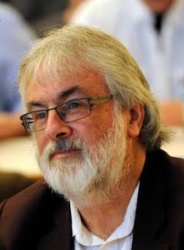Guest Comment: Now The Blood's On Our Hands
Dec. 7, 1941, we are told, is "a date which will live in infamy."
Why? Because our president, Franklin Delano Roosevelt, said so? Partly, but, as everyone must know by now, Dec. 7, 1941, is the date Japan attacked Pearl Harbor in Hawaii without provocation or warning.
Another date "which will live in infamy" might be April 19, 1995, the day Timothy McVeigh blew up the federal building in Oklahoma City. Without provocation or warning, McVeigh killed 168 people he didn't know.
McVeigh, who died today for his deed, did not see the world the way most of us see it. By blowing up the federal building, he felt he was avenging another "day of infamy," April 19, 1993.
That's the day federal agents attacked the Branch Davidian compound outside Waco, Texas, an attack that ended with a horrendous fire and the deaths of about 80 people, including many children.
America avenged Pearl Harbor by defeating the Japanese in World War II and using atomic bombs to pulverize two Japanese cities, Hiroshima and Nagasaki.
America punished Japan, McVeigh punished America.
McVeigh is not alone; others feel that America must be brought to account for its sins, real or imagined.
One such person is Osama bin Laden, a Saudi businessman and multimillionaire, who is disturbed by (among other things) white devils occupying space on sacred Saudi Arabian soil. Bin Laden is believed to be the mastermind behind the 1998 destruction by bomb of American embassies in Kenya and Tanzania.
To avenge those bombings, former president Bill Clinton ordered missiles fired on bin Laden's encampment in Afghanistan.
The sneak attack came without warning and without a declaration of war. It occurred on Aug. 20, 1998, a date that will not live in infamy, at least not in our part of the world.
According to credible-sounding witnesses, at least one of the American missiles hit a mosque and killed 27 children.
"Collateral damage," says a local talk-show host.
"Collateral damage," says Timothy McVeigh of the innocent children who died in his bombing.
There are people who believe that Bill Clinton is a war criminal who should be brought to trial for ordering death and destruction in Afghanistan.
How, I wonder, do we separate the Tim McVeighs of the world from the Bill Clintons, from the Osama bin Ladens, from the Japanese leaders who ordered the Pearl Harbor attack?
The pulse of patriotism beat loudly in all their chests. McVeigh honestly thought he was doing the right thing for his country. So did Clinton, bin Laden and the Japanese leaders.
McVeigh saw himself not as a murderer but as a soldier. Clinton, who ordered the attack during the height of his Monica Lewinski scandal, does not see himself as a murderer. Nor does bin Laden, nor did the Japanese leaders.
How are they different than us? Today, as we killed Timothy McVeigh, we did not see ourselves as killers. Rather, we are "balancing the scales of justice." We are "administering the law" (which we wrote).
Killing someone who "deserves to die" is not evil, in our opinion. Many even believe that killing killers enhances respect for human life. We show how much we respect life by destroying it.
We earnestly believe we are somehow protecting ourselves by killing certain men and women in our custody. We deliberately ignore the experience of less blood-thirsty cultures, which have become much safer than ours in part because their governments don't see killing as a solution to problems.
I sometimes wonder if I am some sort of reverse Rip Van Winkle, taking a nap and awaking at some earlier, more primitive time. I had that feeling the other night watching "Politically Incorrect" with Bill Maher.
For those who don't know, Maher's show is a panel discussion. Maher, who could be described as a liberal with some conservative points of view, has four guests each night, two liberals and two conservatives. They discuss issues of the day, usually in an entertaining way.
On the night in question, the question of Timothy McVeigh's punishment came up and it was suggested by one panelist that McVeigh should be tortured before being put to death, that a serene, peaceful death was too good for him.
Nobody disagreed with that!
In fact, the five of them got into the spirit of things and started offering a series of sadistic tortures that might be imposed upon McVeigh before his demise ... and the audience ate it up.
This, my friends, was in the United States of America in the year 2001.
I was raised a Christian and, although my faith has wavered considerably, I still hold many Christian beliefs.
One of them is the commandment: "Thou shalt not kill."
When I was taught that as a child, it made excellent sense to me. If everybody believed killing was wrong, I thought, we would all be safe.
"Thou shalt not kill." What a simple, straightforward thought. I actually believed it. I still do.
The difference between those of us who would cheerfully kill Timothy McVeigh and a man who feels he must kill his unfaithful wife is very small.
The only way to understand this is to understand that the bad guy is not the issue. Of course we hate the bad guy. Of course we'd like to kill him.
But, when we do, we become him.
Harley Sorensen is a longtime journalist and iconoclast. His column appears Mondays in the San Francisco Chronicle. This column is republished by permisison. E-mail him at harleysorensen@yahoo.com.


 Adrian Maidment: Supermarket Signs
Adrian Maidment: Supermarket Signs Ian Powell: Revisiting Universalism
Ian Powell: Revisiting Universalism Martin LeFevre - Meditations: In A Global Society, There Is No Such Thing As “National Security”
Martin LeFevre - Meditations: In A Global Society, There Is No Such Thing As “National Security” Binoy Kampmark: Secrecy And Virtue Signalling - Another View Of Signalgate
Binoy Kampmark: Secrecy And Virtue Signalling - Another View Of Signalgate Gordon Campbell: On The Americanising Of NZ’s Public Health System
Gordon Campbell: On The Americanising Of NZ’s Public Health System Ian Powell: Trumpian Health Leadership
Ian Powell: Trumpian Health Leadership